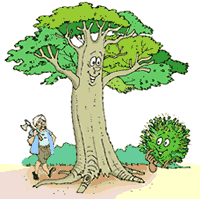Snake
Snake :
A snake came to my water-trough
On a hot, hot day, and I in pyjamas for the heat,
To drink there.
In the deep, strange-scented shade of the great dark carob-tree
I came down the steps with my pitcher
And must wait, must stand and wait; for there he was at the trough
before me.
He reached down from a fissure in the earth-wall in the gloom
And trailed his yellow-brown slackness soft-bellied down,
over the edge of the stone trough,
And rested his throat upon the stone bottom,
And where the water had dripped from the tap, in a small clearness,
He sipped with his straight mouth,
Softly drank through his straight gums, into his slack long body,
Silently.
Someone was before me at my water-trough,
And I, like a second comer, waiting.
He lifted his head from his drinking, as cattle do,
And looked at me vaguely, as drinking cattle do,
And flickered his two-forked tongue from his lips, and mused a
moment,
And stooped and drank a little more,
Being earth-brown, earth-golden from the burning bowels of the
earth,
On the day of Sicilian July, with Etna smoking.
The voice of my education said to me:
He must be killed,
For in Sicily the black, black snakes are innocent, the gold are
venomous.
And voices in me said: If you were a man
You would take a stick and break him now, and finish him off.
But must I confess how I liked him,
How glad I was he had come like a guest in quiet, to drink at my
water-trough
And depart peaceful, pacified, and thankless,
Into the burning bowels of this earth?
Was it cowardice, that I dared not kill him?
Was it perversity, that I longed to talk to him?
Was it humility, to feel so honoured?
I felt so honoured.
And yet those voices:
If you were not afraid, you would kill him.
And truly I was afraid, I was most afraid;
But even so, honoured still more
That he should seek my hospitality
From out the dark door of the secret earth.
He drank enough
And lifted his head, dreamily, as one who has drunken,
And flickered his tongue like a forked night on the air, so
black,
Seeming to lick his lips,
And looked around like a god, unseeing, into the air,
And slowly turned his head,
And slowly, very slowly, as if thrice adream,
Proceeded to draw his slow length curving round
And climb again the broken bank of my wall-face.
And as he put his head into that dreadful hole,
And as he slowly drew up, snake-easing his shoulders, and
entered farther,
A sort of horror, a sort of protest against his withdrawing
into that horrid black hole,
Deliberately going into the blackness, and slowly drawing
himself after,
Overcame me now his back was turned.
I looked round, I put down my pitcher,
I picked up a clumsy log
And threw it at the water trough with a clatter.
I think it did not hit him,
But suddenly that part of him that was left behind
convulsed in undignified haste,
Writhed like lightning, and was gone
Into the black hole, the earth-lipped fissure in the wall-front,
At which, in the intense still noon, I stared with fascination.
And immediately I regretted it.
I thought how paltry, how vulgar, what a mean act!
I despised myself and the voices of my accursed human education.
And I thought of the albatross,
And I wished he would come back, my snake.
For he seemed to me again like a king,
Like a king in exile, uncrowned in the underworld,
Now due to be crowned again.
And so, I missed my chance with one of the lords
Of life.
And I have something to expiate;
A pettiness.
D.H. Lawrence
David Herbert Lawrence (1885-1930) occupies a unique position among the leading Modernist writers of the generation that came of age before the outbreak of the First World War. D.H. Lawrence was born near Nottingham in the English Midlands. D.H. Lawrence spent several years as a teacher before turning to writing for a livelihood.
Although D.H. Lawrence is best known for his novels and short stories, he was also a fine poet who wrote free verse. His poetry concentrates on the life-giving force of nature and exalts the physical and instinctual over the purely intellectual.
